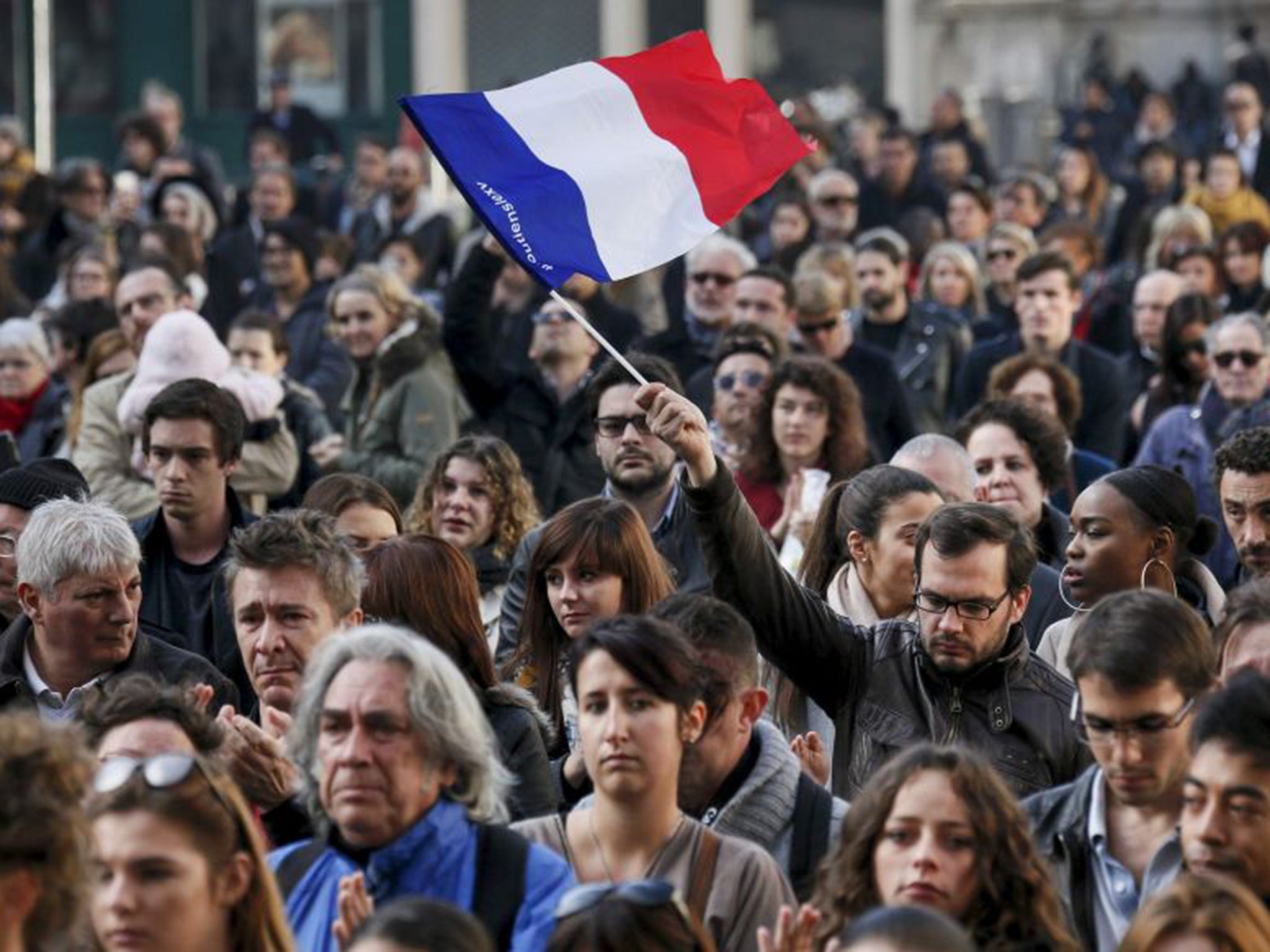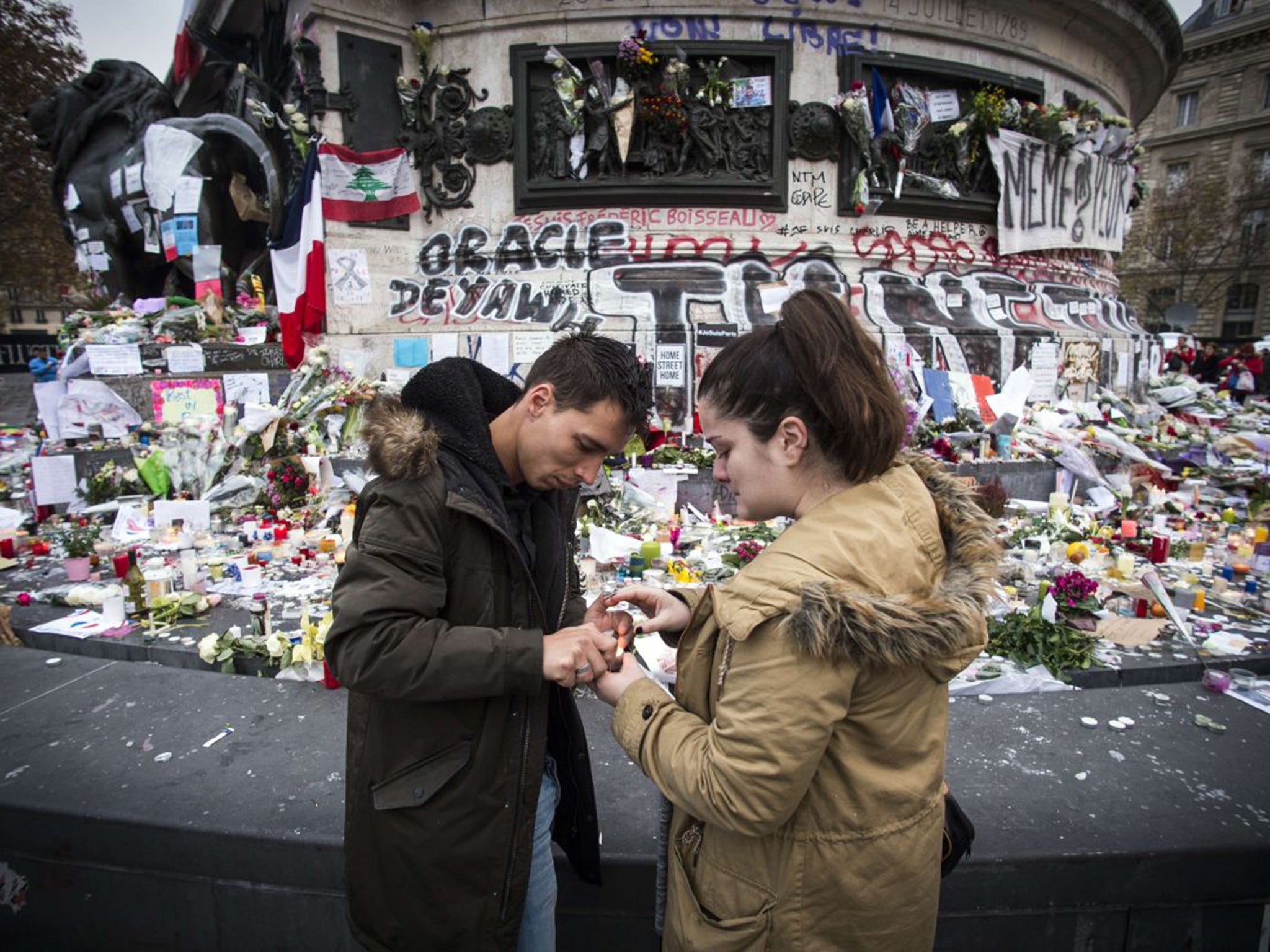Paris terror attacks: Parisians seek answers as they mark second terror strike this year
Perhaps ordinary people are still too shocked, but there was little anger directed at the government

Your support helps us to tell the story
From reproductive rights to climate change to Big Tech, The Independent is on the ground when the story is developing. Whether it's investigating the financials of Elon Musk's pro-Trump PAC or producing our latest documentary, 'The A Word', which shines a light on the American women fighting for reproductive rights, we know how important it is to parse out the facts from the messaging.
At such a critical moment in US history, we need reporters on the ground. Your donation allows us to keep sending journalists to speak to both sides of the story.
The Independent is trusted by Americans across the entire political spectrum. And unlike many other quality news outlets, we choose not to lock Americans out of our reporting and analysis with paywalls. We believe quality journalism should be available to everyone, paid for by those who can afford it.
Your support makes all the difference.For a second time in less than a year, Parisians have held a two-minute silence to remember those killed in a terrorist strike while news broke that the authorities may have missed vital clues which pointed to the possibility of an attack.
The grief was still raw in the Place de la République, but as “La Marseillaise” was sung by people as they drifted back to their offices at just after midday, the question most wanted an answer to was why France had been targeted again.
“We are all still asking, why?” said Clara Stein, a 19- year-old au pair. “We were all so deeply shocked in January after Charlie Hebdo, but here we are again. Maybe we need more security, but really what can really be done? It’s so worrying to think that maybe we will be back here again in the future after another attack.”
Various theories were offered by those in the central square, from the fact that France’s warplanes are now bombing Isis targets in Syria, to high levels of immigration, to the fact that in two week’s time, Paris hosts the COP21 environmental summit.
“France is a symbol of everything that the terrorists hate,” offered Costanza Cioni, a 22 year-old student. “Liberté, égalité, fraternité – everyone knows that those are the values that France stands for. Those are the values that Isis hates and why Paris has become such a target.”
If Friday’s attacks were revenge against France for its role in the war against Isis in Syria, Parisians did not feel that the price was too high. “We should intensify the bombings on Isis after this and show them that we won’t be beaten,” said Rachid Magdod, a 57-year-old of Moroccan descent.
“We have had so many people from France going to fight in Syria, and now they are coming back to kill us at home. I don’t blame the government for this, it is impossible to stop everyone, but it shows that the war is necessary,” he said.
Mr Magdod, and others, refused to blame President François Hollande’s government for not stopping the attacks, despite the news that in the early hours of Saturday morning French police stopped but failed to detain Salah Abdeslam, who on Sunday night was named as a key suspect.
“There is too much sadness to start blaming people – it is difficult to know what the government can do,” said Marie, who was one of several people interviewed by The Independent who declined to give her surname. “Anger will not help us at this moment,” agreed Ms Cioni.
David Cameron announced that the UK has prevented seven planned terror attacks in the past six months, while the Spanish government has detained as many as 60 people since the start of year over alleged links to Isis.
French officials have also prevented what they say were plans to attack public targets. In August, for example, a man in his 30s was planning an attack on a concert hall in Paris, but was arrested after being monitored by security agencies for several weeks.

But it is in France that two atrocities have occurred. Turkish officials said that they had twice notified their French counterparts, last December and in June, about Omar Ishmail Mostefai, the first of the suicide bombers to have been identified, but that France only asked for more details after Friday’s attacks.
A number of public figures in France began to blame the government for the security shortcomings. Alexis Brézet, the editorial director of the right-leaning Le Figaro newspaper, said: “The government needs to break completely with the culture of wishful thinking and denial, if it wants to be up to the historical challenge which our country is facing. It was a war. A real war. We knew it, but in the end, we preferred to turn a blind eye.”
Perhaps ordinary people are still too shocked, but there was little anger directed at the government. “There is so much hate, but we have to try to stop hating,” said Marie. “We are afraid and we’re sad, but we what we need is hope.”
Join our commenting forum
Join thought-provoking conversations, follow other Independent readers and see their replies
Comments